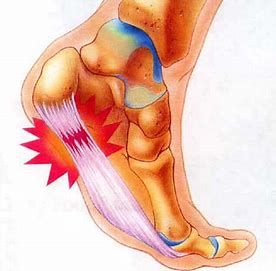Sore Heel? … Maybe it’s Plantar Fasciitis
Feel like you’re standing on a sharp pebble first thing in the morning? Or maybe those first few steps after sitting down for a while are painful through the bottom of your foot? Or maybe you just start to get pretty uncomfortable and sore during your runs or exercise that used to be OK? … Most likely it’s Plantar Fasciitis!
Plantar fasciitis is one of the most common types of foot pain and usually affects the heel.
So what is it?
You’re plantar fascia is a thick fibrous band of connective tissue that connects from the bottom surface of your heel bone to the bones in your toes along the sole of your feet (see picture). Its job is to help maintain the arch in your foot. If tension is placed on this area, small microfiber tears and inflammation can occur, causing plantar fasciitis.
When the foot is not supporting the body's weight the plantar fascia tends to contract and shorten slightly, consequently there is an increased pull during the first few steps after a period of rest and pain is most acute at this time. After a few steps it may warm up a little resulting in reduced pain. Think of this as being similar to a cut on your knuckle. As your finger stays straight the cut may start to heal, until you bend your finger and cut splits again!
Why is it happening to me?
- An increase in weight-bearing activity e.g. walking, running
- Tight calf muscles
- Weight gain
- High/low arches in the foot
- Poor supportive or ill-fitting footwear
- Decreased core and hip stability resulting in an increased load through the foot
- Age; as we get older our foot may begin to sag causing tension in this area
How can I fix it?
Despite what you may have heard, plantar fasciitis is definitely treatable and we have had great results with every patient.
Each physiotherapist will do a thorough examination to highlight the underlying causes of plantar fasciitis. Whether it’s poor biomechanics from the hips down to the feet, inadequate footwear or just general tension through the calves, you’re physiotherapist will be able to provide some form of manual therapy to help relieve symptoms and advise you on some exercises to help correct the underlying issues.
Our most popular and efficient form of treatment is Shockwave therapy and we provide this service at no extra cost!
Shockwave therapy has been proven to get the best and quickest results. Click here for more info on Shockwave therapy.
TOP TIPS
Some things you can do today to start relieving that dreaded heel pain:
- Pull your toes and foot back and forth with your hands first thing in the morning before stepping out of bed to warm the facia up and prepare it for movement.
- Release the tension through the arch of your foot with some self-massage techniques e.g. rolling your foot on a golf ball or frozen water bottle
- Start stretching your tight calves 2-3 times a day for at least 30 seconds at a time
- Wear supportive shoes at all times. Don’t walk around barefoot, even at home.

